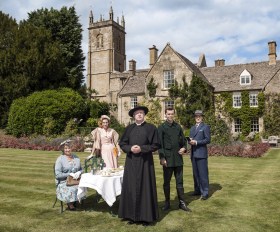This review contains some spoilers for Derry Girls Season 3.
Australians have waited six months for the final season of beloved Northern Irish sitcom Derry Girls to arrive on Netflix. Because of that, and knowing ahead of time that the show was cancelled, reviewing it now is both an obituary and old news. Set in Derry, a Northern Irish city on the border of the Republic, the show follows the misadventures of four girls and a boy in high school during the early 1990s, during the Troubles.
There’s something compelling in stories with foregone conclusions. In an age where we’re all spoiler-phobic, treating surprise as the only possible pleasure in media, it’s refreshing to know from history how Derry Girls will end. The political backdrop of Derry Girls cleverly gets to the core of all teen stories: just because things will change one day, doesn’t mean they didn’t matter then.
It’s a season of ghosts for Derry Girls. Praised for its lyrical dialogue and unflinchingly awkward teen characters, the show delivers more of the same in its third season. It starts a little rocky: the ‘fuck-a-doodle-doos’ are beginning to feel like rote catchphrases, and the kids are falling into the typical teen-drama archetypes the show was once so careful to avoid.
Read: The Bear, Disney+ review: one of 2022’s standout shows
Protagonist Erin (Saoirse-Monica Jackson) is still conceited and romantic; cousin Orla (Louisa Harland) has little to work with beyond her eccentricity; Michelle (Jamie-Lee O’Donnell) chases boys harder than ever; Clare (Nicola Coughlan) is a goody-two-shoes and a wee lesbian; and James (Dylan Llewellyn) remains the odd man out. It’s the parents who really shine: Mary (Tara Lynne O’Neill) and Gerry (Tommy Tiernan) carry much of the serious drama and the funniest exchanges.
Much of the tension in the earlier seasons derived from the close proximity to violence: the tight contrasts between the melodramatic misadventures of teenagers, and the reports of violence that inch closer to the main narrative. We usually see this through the adult characters: as the heroes are off on one of their capers, the parents linger anxiously by the television for news of forestalled peace talks and terror attacks. The final double-length episode skips to 1998’s Good Friday Agreement, where the girls are old enough to vote for demilitarisation.
The season strengthens with the spectre of death hanging over the show. The girls cross the border to spend the night in a haunted house. There’s a Halloween episode to snidely remind us that despite popular belief, it’s not an American holiday. One episode is a flashback to 1977, the height of the Troubles, when Mary and the other parents were teenagers. Another puts Mary under suspicion of an affair, but the idea soon goes up in smoke as her own ambitions emerge.
Read: Heartbreak High, Netflix, review: showing respect, solidarity and consent
These incisive points generate the best drama: we know that the petty infighting of the girls will all end well, but we’re embroiled in the operatic stakes of their exam results. Although we have the political context to understand the terrifying proximity of real catastrophe, Derry Girls masterfully redirects the stakes of the narrative: will the gang beat their rivals at the talent show? Will they get to see a famous musician? Will they make it to their beach holiday?
The paradigm eventually shifts for the kids: due to Coughlan’s commitments on Bridgerton, Clare is only an occasional delight. Erin and James acknowledge their budding romance, but it must remain unfulfilled lest Michelle – Erin’s best friend and James’ cousin – is forced to choose between. Only in the final episode do we discover another dimension to Michelle’s nihilism: her brother is an IRA paramilitary, imprisoned for murder. The Good Friday Agreement stands to release him – but can Michelle and Erin forgive him?
The finale builds up to the Agreement, an event almost as momentous as Erin and Orla’s joint birthday party. The episode is at great risk of falling into something saccharine or exploitative, as a Cranberries song plays over real footage from the Troubles. With Erin’s literary ambitions, it’s able to pin some of the cheesiness on her perspective. She’s afraid that things will change now she’s old enough to steer the course of history, but she’s more afraid that they won’t.
Erin’s grandfather Joe (Ian McElhinney) asks her: ‘What if this all becomes a ghost story you’ll tell your wains one day?’
We know how the story ends. The ghost is a war before a ceasefire, and a teen girl before she grows up. It’s a show that’s ending and airing at the same time. The exchange is an evocative sign-off from showrunner Lisa McGee. The show was based on her own coming of age, told to us many years later. We’re left with the signature discord that made Derry Girls so effective: how hopeful it is for something to become only a ghost story, someday.
Derry Girls Season 3 is currently streaming on Netflix.
Actors:
Director:
Format: Movie
Country:
Release:





